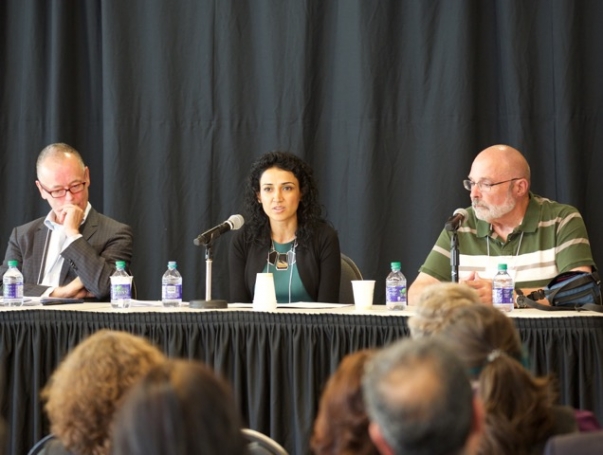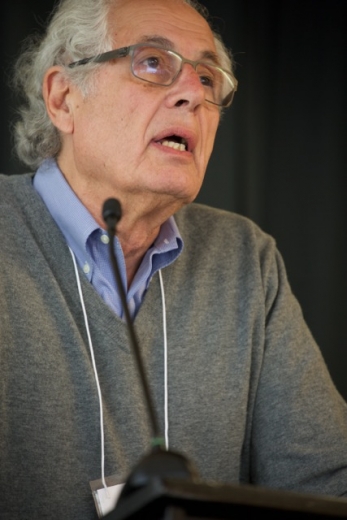Source: news.bahai.org
6 October 2015
OTTAWA — The Baha’i Community of Canada in partnership with the Canadian Immigration Historical Society as well as Carleton University’s Centre for Public History, Migration and Diaspora Studies Initiative, and its Department of History, organized a one-day symposium on the Iranian Baha’i refugee program in Canada, which ran from 1981 to 1989.
Held at the university on 21 September, the event had some 100 people in attendance, including academics, civil servants, students, and community members.
“The Iranian Baha’i refugee program was the first significant refugee program in Canada after the Indochinese refugee movement, which started in the late 1970s,” explained Geoffrey Cameron, principal researcher with the Baha’i Community of Canada. “Canada was the first country to open its doors to Baha’i refugees fleeing violent persecution in Iran.”
The symposium focused on the program in the decade after the 1979 revolution in Iran, during which some 2,300 Baha’is fleeing persecution were placed in over 200 communities across Canada. Their resettlement was part of a special program designed in the 1980s by the Canadian Government, in cooperation with the national governing body of the Baha’i community—the National Spiritual Assembly—of Canada. Canada’s program was used as a model to open doors to resettlement for some 6,000 more Baha’i refugees in 25 countries around the world.
Professor Howard Adelman, Professor Emeritus of Philosophy at York University and a leading scholar in refugee studies, observed that the Baha’i community in Iran was targeted because they “reflect the spirit of modernity in their universalism”.
Mina Sanaee, who was among the refugees resettled in Canada, recalled the traumatic period. “Each Baha’i [who left Iran] faced a supremely painful decision [to leave] after patiently enduring daily acts of violence and injustice…. We were dispirited,” Ms. Sanaee said.
Yet, the refugee program provided a ray of hope for those fleeing persecution. Ms. Sanaee recalled the encouragement she felt when she discovered that Canada would provide resettled Iranian Baha’i refugees. “You will be scattered like gems across the country,” Douglas Martin, the Secretary of the National Spiritual Assembly of the Baha’is of Canada at that time, told her, after he had returned from visiting Baha’i refugees in Pakistan.
Gerry Van Kessel, who was Director-General of Operations for Refugee Affairs in the 1980s, commented that his work on the Baha’i program had been a “career highlight”. When Mr. Martin approached the government for their assistance, there was an existing structure to facilitate the settlement of Baha’is from Iran. However, Van Kessel observed that what made the program work was the “trust and credibility” developed between Baha’i representatives and public servants. “That’s how you get cooperation… and your credibility with us made this work.”
Participants in the conference also heard from the perspective of refugees and civil servants in the field. All of those who worked on the program recalled Mona Mojgani, who served as the Director of the International Baha’i Refugee Office until it was dissolved in 1989.
“Mona made our jobs easier… she helped us to organize the Baha’is for us, and she understood how we worked. We trusted her,” said Dennis Scown, who was the immigration program manager in Islamabad during the 1980s.
Mark Davidson, now Director-General at Citizenship and Immigration Canada, was on his first posting to Islamabad, and he recalled being astounded by the remote locations to which Baha’is were resettled. More than 100 local communities as far away as Sandspit, BC, were sponsoring Baha’is.
Afsoon Houshidari, who spoke on one of the panels at the conference, was four years old when her family fled Iran, and she shared her personal anecdotes and recollections of waiting for resettlement in Karachi and the excitement of preparing for departure to come to Canada. She only recently discovered that her family’s visas were signed by her co-panelist, Dennis Scown.
The audience also heard from the experiences of other Baha’i refugees who came to Canada in the 1980’s, as well as from the perspective of community members who welcomed the arrival of the refugees. Panelists commented that each experience was unique, and many involved trauma and great difficulty. The resilience of the Baha’i refugees was often strengthened by their beliefs and the unique cross-cultural connections made with their co-religionists and other Canadians.
The day concluded with final reflections about placing the Baha’i refugee program in a wider context—as a case study that forms part of the landscape of Canadian history and public policy.
Reflecting on the event, Mr. Cameron said, “At a time when the large-scale movement of people, and particularly those seeking asylum, is presenting profound challenges to policy makers and citizens everywhere, we feel this reflection on the experience of the Iranian Baha’i refugees in Canada yields certain lessons, which although modest, appear to provide relevant insights at this particular juncture.”
Mr. Cameron explained that the symposium was an opportunity to explore lessons from the Canadian response in the 1980’s and its cooperation with the Baha’i community of Canada to settle refugees. Beyond the policy response, however, Mr. Cameron highlighted the contributions of agencies and individuals in implementation of the program, noting “their creativity, flexibility, and desire to do the right thing”.
Commenting on the role of the Baha’i community in the success of the program, Mr. Cameron said, “We sought to understand what the government could and couldn’t do and then committed ourselves to working within those parameters. Many of the government officials commented that the orientation of the Baha’is and their worldview made the whole program work smoothly.”
More information about the symposium is available here: www.symposium.bahai.ca
Further background on the Baha’i refugee program, can be found athttp://reviewcanada.ca/magazine/2013/07/a-quiet-exodus/



Leave a Reply